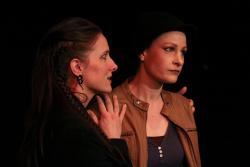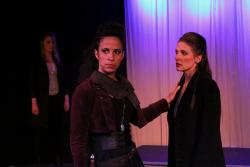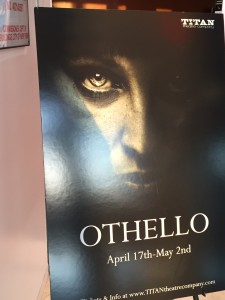 Roughly seven hours before the curtain went up on the Titan Theatre’s all-female Othello, I was talking with my brilliant graduate student Tara Bradway about how she prepares to play male roles, including most recently Shakespeare’s King Richard II. (Check out her fabulous Adirondack Shakespeare Company & go see their plays if you’re upstate!) She insisted that female bodies should and can play male parts, and although she talked about a few physical tricks that she used — changing her walk, the way she held her arms, etc — basically her claim was that women can play all the parts, just as men (and boys) did in Shakespeare’s own company.
Roughly seven hours before the curtain went up on the Titan Theatre’s all-female Othello, I was talking with my brilliant graduate student Tara Bradway about how she prepares to play male roles, including most recently Shakespeare’s King Richard II. (Check out her fabulous Adirondack Shakespeare Company & go see their plays if you’re upstate!) She insisted that female bodies should and can play male parts, and although she talked about a few physical tricks that she used — changing her walk, the way she held her arms, etc — basically her claim was that women can play all the parts, just as men (and boys) did in Shakespeare’s own company.
I didn’t know that conversation would be such good preparation for seeing Titan’s Othello later that night at the lovely Queens Theatre in the middle of Corona Park, in the shadow of the historic New York State Pavilion, built for the 1964-65 World’s Fair. 
In Lenny Banovez’s production, women played all the roles as women. Instead of insisting, as most same-sex productions do, that any body can play any part as written, this production dug into the language and feminized (almost) everything: Brabantio became Desdemona’s “mother,” all pronouns were “she” and “her,” and in a few cases the language was re-structured to avoid sex-specific terms. (No “circumcised dog” in this version of Othello’s last speech.) They kept “Lord” as a term of rank, and a few sirs, and I heard one (perhaps mistaken?) reference to Othello’s father, who gave his mother the “antique token” of the handkerchief (5.2). While they did not feminize any of the Italian names — it remained Othello and Cassio, as opposed to Emilia and Desdemona — the single-gender fiction seemed determined and almost complete. There were two different kinds of female performers on stage, some in boots and pants and carrying swords, the others unarmed, in dresses, wearing sandals or soft shoes. But they were all women.
The result was strange, more disorienting that I would have thought, and a powerful reminder of how thoroughly gendered English speech and stage conventions are. I’m not quite sure what I think about it — I remember disliking Helen Mirren’s performance as “Prospera,” the maternal mage at the center of Julie Taymor’s film The Tempest, though I think not because of the gender gambit. In places the shift felt awkward, though perhaps a good reminder of how thoroughly we’ve naturalized English’s gender conventions. I spent much of the show thinking about a world without men, and about how the play’s mix of jealousy, violence, and attachment changes in an all-female world.
The night’s revelation was Laura Frye’s Iago. Especially in the first half of the play, she charmed with stage presence and charisma. The motive hunting soliloquies were playful, inviting, even flirtatious —
I know not if’t be true
But I for mere suspicion in that kind
Will do as if for surety. (1.3.87-89).
As the play grew more violent and entangled in its plots — the direction was fast, the cuts numerous, and the action sudden, with actors waiting in chairs onstage ready to re-enter as fast as they could — Iago turned. I thought of Tamora, Queen of the Goths in Titus, which I saw with my students this past winter. I wondered about the gendered conventions of stage villainy. Is it sexist to find a female Iago less empathetic than the hearty soldier we’re used to? Did Frye’s blazing smile, and her barely contained loathing of the more typically feminine Emilia and Desdemona, collude with a deep misogynist fantasy that wants to keep women away from certain kinds of power even in our supposedly feminist age?
As I watched this Iago I worried about Hillary Clinton and what our culture feels when we see powerful women.
Perhaps the female Othello should have occupied this thought more directly, but I didn’t find Leah Dutchin’s performance quite as compelling as did the Queens Gazette. She spoke the Othello music with authority, and the romance-inflected “story of my life” passage to Brabantio was gorgeous, but she could not really compete for center stage with Iago. Dutchin’s Moor seemed a bit over-matched, as I suppose Othello always does when faced with Iago. I don’t think it was the gender switch that diminished the general — though it is true that her rage does not fit easily into the Medea-frame through which we tend to read murderous female jealousy.
The text was chopped and compressed, including moving the great exchange of vows between Othello and Iago from the play’s middle (3.3) to quite a bit later during the second half of the action. One striking change that I did not like was treating Othello’s wounding of Iago in the final scene as a death-wound, so that the villain’s “I bleed, sir, but not killed” (5.2.285) seemed false bravado. At the final curtain the fatal bed held four bodies: smothered Desdemona, stabbed Emilia, self-stabbed Othello, but also Iago, clinging to her last breaths. Iago’s final lines are among the most chilling in all of Shakespeare —
Demand me nothing. What you know, you know.
From this time forth I never will speak word (5.2.300-01)
I missed the violent independence that I think those lines demand.
But I was pleased to make the acquaintance of the Titans in their new home at the Queens Theatre. Get into Corona Park before the run ends on May 2!




[…] Queens Theatre, from Titan Theatre Company. Steve Mentz has written a very good review on his own blog, which rightly highlights the extraordinary performance of Laura Frye as […]